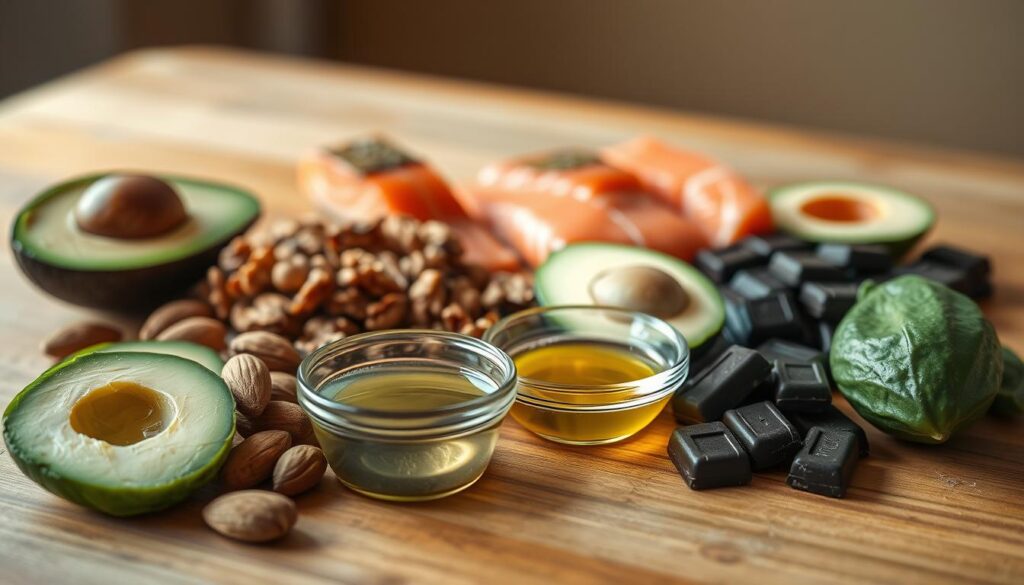This post contains affiliate links. As an Amazon Associate I earn from qualifying purchases
Embarking on a journey to nourish your heart with a delicious and balanced eating plan is a step towards a healthier, happier you. A heart-healthy diet is not just about cutting out fats or reducing salt intake; it’s about embracing a lifestyle that promotes cardiovascular health through nutritious eating.
By focusing on whole, nutrient-dense foods, you can significantly reduce your risk of heart disease and improve your overall well-being. This comprehensive guide will walk you through the essentials of a balanced diet that supports heart health.
Key Takeaways
- Eating a balanced diet is crucial for heart health.
- Focus on whole, nutrient-dense foods to reduce heart disease risk.
- A heart-healthy lifestyle promotes overall well-being.
- Nourishing your heart can lead to a healthier, happier life.
- A well-planned diet can significantly improve cardiovascular health.
What is a Heart-Healthy Diet?
Understanding the components of a heart-healthy diet is crucial for making informed food choices. A heart-healthy diet is designed to promote cardiovascular well-being by focusing on nutrient-rich foods that support overall health.
Understanding Heart Health
Heart health is closely linked to the foods we consume. A diet that is rich in essential nutrients can help maintain a healthy heart by reducing the risk of cardiovascular diseases. Key factors that influence heart health include genetics, lifestyle, and dietary habits.
Eating a balanced diet that is low in saturated fats, sodium, and added sugars can significantly contribute to heart health. It’s also important to stay hydrated and limit the consumption of processed and high-calorie foods.
Importance of Nutrition
Nutrition plays a vital role in maintaining heart health. A diet that is rich in fruits, vegetables, whole grains, and lean proteins provides the necessary nutrients to support cardiovascular health. Nutrients like omega-3 fatty acids, fiber, and antioxidants are particularly beneficial for the heart.
A well-balanced diet helps in managing weight, lowering cholesterol levels, and regulating blood pressure, all of which are critical for maintaining a healthy heart.
Key Components of a Heart-Healthy Diet
A heart-healthy diet includes a variety of foods from different food groups. The key components include:
- Fruits and vegetables
- Whole grains
- Lean proteins
- Healthy fats
Here’s a breakdown of how these components contribute to heart health:
| Food Group | Examples | Benefits |
|---|---|---|
| Fruits and Vegetables | Apples, spinach, berries | Rich in fiber, vitamins, and antioxidants |
| Whole Grains | Oatmeal, brown rice, quinoa | High in fiber, helps lower cholesterol |
| Lean Proteins | Chicken, fish, beans | Low in saturated fats, supports heart health |
| Healthy Fats | Avocado, nuts, olive oil | Rich in unsaturated fats, supports heart health |
By incorporating these food groups into your diet, you can take a proactive approach to maintaining heart health and reducing the risk of cardiovascular diseases.
The Benefits of Eating for Heart Health
Eating for heart health is not just about avoiding certain foods, but embracing a nutritious diet that fosters well-being. A heart-healthy diet provides numerous benefits that can significantly improve cardiovascular health.
Lowering Cholesterol Levels
One of the key benefits of a heart-healthy diet is its ability to help lower cholesterol levels. High cholesterol is a major risk factor for heart disease, and dietary changes can play a crucial role in managing it. Foods rich in soluble fiber, such as oats, barley, and fruits like apples and berries, can help reduce cholesterol levels.
- Increasing soluble fiber intake
- Choosing healthy fats, such as those found in avocados and nuts
- Avoiding trans fats and saturated fats
Reducing Blood Pressure
A nutritious diet can also help in reducing blood pressure, another significant risk factor for heart disease. Consuming foods rich in potassium, such as leafy greens, bananas, and sweet potatoes, can help balance sodium levels in the body and lower blood pressure.
- Eating potassium-rich foods
- Limiting sodium intake
- Staying hydrated
Weight Management and Heart Health
Maintaining a healthy weight is crucial for heart health, and a balanced diet plays a vital role in weight management. By focusing on whole, unprocessed foods like vegetables, fruits, whole grains, and lean proteins, individuals can achieve and maintain a healthy weight, reducing the risk of heart disease.
Some key strategies for weight management include:
- Eating regular, balanced meals
- Avoiding overeating by being mindful of portion sizes
- Incorporating physical activity into daily routines
Essential Foods for a Heart-Healthy Diet
To nourish your heart, it’s vital to focus on consuming a variety of whole foods. A well-balanced diet is the cornerstone of maintaining optimal heart health. By incorporating the right foods into your meals, you can significantly reduce the risk of heart disease and improve your overall well-being.
Fruits and Vegetables
Fruits and vegetables are packed with vitamins, minerals, and antioxidants that are essential for heart health. They are rich in fiber, which can help lower cholesterol levels and regulate blood pressure. Aim to include a variety of colorful fruits and vegetables in your diet, such as leafy greens, berries, and citrus fruits.
Some of the best options include:
- Leafy greens like spinach and kale
- Cruciferous vegetables like broccoli and cauliflower
- Berries such as blueberries and strawberries
- Citrus fruits like oranges and grapefruits
Whole Grains
Whole grains are another crucial component of a heart-healthy diet. They are rich in fiber, vitamins, and minerals that can help lower cholesterol levels and improve blood lipid profiles. Examples of whole grains include brown rice, quinoa, whole wheat bread, and whole grain pasta.
Incorporating whole grains into your diet can be simple:
- Start your day with a bowl of oatmeal
- Switch to whole grain bread for your sandwiches
- Use quinoa as a side dish or add it to your salads
Lean Proteins
Lean proteins are vital for maintaining heart health. They can help lower cholesterol levels and provide essential nutrients. Opt for lean protein sources like poultry, fish, beans, and legumes. It’s also important to limit your intake of processed meats and choose cooking methods that are low in added fats.
Some healthy lean protein options include:
- Grilled chicken or fish
- Legumes like lentils and chickpeas
- Beans such as black beans and kidney beans
Healthy Fats: What You Need to Know
Incorporating healthy fats into your diet can significantly enhance your nutritional intake and support heart health. Healthy fats are not only a vital source of energy, but they also play a crucial role in the absorption of vitamins and the maintenance of healthy cells.
Not all fats are created equal, and understanding the different types can help you make informed choices about your diet. Omega-3 fatty acids and monounsaturated fats are particularly beneficial for heart health, offering anti-inflammatory properties and helping to lower cholesterol levels.
The Role of Omega-3 Fatty Acids
Omega-3 fatty acids are a type of polyunsaturated fat that are essential for heart health. They help reduce inflammation in the body, lower triglycerides, and slow the development of plaque in arteries. These benefits can lead to a reduced risk of heart disease and stroke.
Benefits of Omega-3 Fatty Acids:
- Reduces inflammation
- Lowers triglycerides
- Slows plaque development in arteries
Foods rich in omega-3 fatty acids include fatty fish like salmon, sardines, and mackerel. For those who do not consume fish, supplements are available, but it’s always best to consult with a healthcare provider before adding any supplements to your diet.
Sources of Monounsaturated Fats
Monounsaturated fats are another type of healthy fat that can help lower total cholesterol and LDL (“bad”) cholesterol levels. They are found in high amounts in foods like avocados, nuts, and olive oil.
Sources of Monounsaturated Fats:
| Food | Serving Size | Monounsaturated Fat Content |
|---|---|---|
| Avocado | 1 medium | 10 grams |
| Almonds | 1 ounce (23 nuts) | 8 grams |
| Olive Oil | 1 tablespoon | 10 grams |
Incorporating these healthy fats into your diet can be simple. Try adding sliced avocado to your sandwich, using olive oil for cooking, or snacking on nuts and seeds.

By understanding the importance of healthy fats and how to incorporate them into your diet, you can take a significant step towards maintaining a balanced nutrition and promoting heart health.
Foods to Limit or Avoid
While incorporating healthy foods is crucial, it’s equally important to identify and limit foods that can harm heart health. Consuming high amounts of unhealthy foods can lead to increased risks of heart disease, high blood pressure, and other cardiovascular conditions.
Sugary Beverages and Snacks
Sugary drinks and snacks are high in calories and added sugars, contributing to weight gain, insulin resistance, and an increased risk of heart disease. Reducing the intake of sugary beverages like soda and limiting snacks that are high in sugar can significantly improve heart health.
Processed Foods
Processed foods often contain high levels of sodium, unhealthy fats, and preservatives, which can negatively impact heart health. Choosing whole, unprocessed foods as much as possible can help minimize the intake of these harmful substances.
Sodium and Its Impacts
Excessive sodium consumption is linked to high blood pressure, a major risk factor for heart disease. Adopting a low-sodium diet can help mitigate this risk. Being mindful of sodium content in foods, especially in processed and restaurant meals, is crucial.
| Food Item | Sodium Content (mg) | Percentage of Daily Value (%) |
|---|---|---|
| 1 cup canned soup | 940 | 39 |
| 1 slice whole wheat bread | 170 | 7 |
| 1 cup cooked instant noodles | 1,760 | 73 |
By being aware of the foods to limit or avoid and making informed choices, individuals can significantly reduce their risk of heart disease and promote overall cardiovascular health.
Crafting a Heart-Healthy Meal Plan
Developing a heart-healthy meal plan involves understanding the right balance of foods that support cardiovascular health. It’s about creating a sustainable eating pattern that nourishes your heart and overall well-being.
A heart-healthy meal plan is not just about cutting out unhealthy foods; it’s also about incorporating a variety of fiber-rich foods that help lower cholesterol levels and improve digestion. Foods high in fiber include fruits, vegetables, whole grains, and legumes.
Sample Meal Ideas
To get started, here are some sample meal ideas that incorporate heart-healthy foods:
- Oatmeal with fresh berries and nuts for breakfast
- Grilled chicken salad with mixed greens, vegetables, and a citrus vinaigrette for lunch
- Baked salmon with quinoa and steamed broccoli for dinner
These meals are not only delicious but also packed with nutrients that support heart health.
Tips for Grocery Shopping
Grocery shopping is a crucial step in maintaining a heart-healthy diet. Here are some tips to help you shop smart:
- Make a list before you go to the store to avoid impulse buys.
- Shop the perimeter of the store where fresh produce, meats, and dairy products are typically located.
- Choose whole grains over refined grains.
- Read labels to limit foods high in sodium and added sugars.
Balancing Macronutrients
Balancing macronutrients is essential for a heart-healthy diet. This means consuming the right amounts of carbohydrates, proteins, and fats. Complex carbohydrates like whole grains, proteins such as lean meats and fish, and healthy fats found in nuts and avocados should be staples in your diet.
By focusing on whole, unprocessed foods and being mindful of your macronutrient intake, you can create a balanced meal plan that supports your heart health.
Heart-Healthy Snacks to Keep You Going
Snacking smart is key to maintaining energy levels and supporting a heart-healthy lifestyle. With so many options available, it can be challenging to choose snacks that are both nutritious and delicious. In this section, we’ll explore some nutritious choices for on-the-go and provide easy homemade snack ideas to keep you going throughout the day.
Nutritious Choices for On-the-Go
When you’re in a hurry, it’s easy to reach for convenient but unhealthy snacks. However, there are plenty of heart-healthy options that are just as convenient. Consider keeping a stash of:
- Nuts and seeds, such as almonds and pumpkin seeds
- Dried fruits like apricots and cranberries
- Energy bars made with wholesome ingredients
- Fresh fruit, like apples and bananas
These snacks are not only heart-healthy but also rich in fiber, vitamins, and minerals.
Easy Homemade Snack Ideas
Preparing your own snacks at home can be a fun and rewarding experience. Here are some easy homemade snack ideas to get you started:
- Trail mix made with nuts, seeds, and dried fruit
- Homemade energy balls using oats, honey, and peanut butter
- Roasted chickpeas seasoned with herbs and spices
- Yogurt parfait with granola and fresh berries
These snacks are not only delicious but also packed with nutrients that support a heart-healthy lifestyle. By incorporating these ideas into your daily routine, you’ll be well on your way to maintaining a balanced diet.
In conclusion, snacking smart is an essential part of maintaining a heart-healthy lifestyle. By choosing nutritious options and preparing easy homemade snacks, you can keep your energy levels up and support your overall well-being.
Incorporating Physical Activity into Your Routine
Physical activity plays a vital role in a heart-healthy lifestyle, complementing dietary choices for overall cardiovascular health. Regular exercise not only strengthens the heart but also improves circulation, boosts mood, and enhances overall well-being.
Importance of Exercise for Heart Health
Exercise is essential for maintaining heart health. It helps lower blood pressure, improve lipid profiles, and manage weight. Regular physical activity can also reduce the risk of heart disease, stroke, and diabetes.
Key Benefits of Exercise for Heart Health:
- Improves cardiovascular function
- Enhances muscular strength and endurance
- Supports weight management
- Reduces stress and anxiety
Fun Ways to Stay Active Every Day
Incorporating physical activity into your daily routine can be enjoyable and doesn’t have to feel like a chore. Here are some fun ways to stay active:
- Take a brisk walk or jog in the morning
- Engage in cycling or swimming for a low-impact workout
- Try yoga or Pilates for flexibility and relaxation
- Dance to your favorite music or join a dance class
- Garden or do other outdoor activities that keep you moving
Finding an activity you enjoy is key to making physical activity a sustainable part of your lifestyle.

By incorporating physical activity into your routine, you can significantly enhance your heart health and overall quality of life. Remember, every step counts, and making small changes can lead to big improvements over time.
Staying Motivated on Your Heart-Healthy Journey
Staying motivated on your path to heart health involves setting the right goals and tracking your progress effectively. A heart-healthy journey is not just about adopting a temporary diet or exercise routine; it’s about embracing a lifestyle that promotes overall well-being and reduces the risk of cardiovascular diseases.
Setting Realistic Goals
Setting achievable goals is the first step towards maintaining motivation. It’s essential to define what you want to accomplish in a specific timeframe. For instance, aiming to include a certain number of servings of fruits and vegetables in your diet each day or planning to walk a certain number of steps daily are tangible goals.
To make your goals more effective, consider the SMART criteria:
- Specific: Clearly define what you want to achieve.
- Measurable: Quantify your goal so you can track progress.
- Achievable: Ensure the goal is realistic based on your current lifestyle.
- Relevant: Align your goal with your overall objective of improving heart health.
- Time-bound: Set a specific timeframe for achieving your goal.
Tracking Your Progress
Tracking your progress is crucial for staying motivated. It helps you understand what’s working and what areas need improvement. There are several ways to monitor your progress on your heart-healthy journey:
| Method | Description | Benefits |
|---|---|---|
| Food Diary | Record everything you eat and drink. | Helps identify patterns and unhealthy choices. |
| Activity Tracker | Use a device or app to track physical activity. | Provides insights into daily activity levels and progress. |
| Health Metrics | Regularly check blood pressure, cholesterol levels, etc. | Offers a clear picture of your cardiovascular health improvements. |
By setting realistic goals and effectively tracking your progress, you can maintain the motivation needed to continue on your heart-healthy journey. This not only improves your cardiovascular health but also enhances your overall quality of life.
Remember, every small step counts, and celebrating your achievements along the way can provide the encouragement needed to keep moving forward.
Conclusion: Start Your Heart-Healthy Journey Today
Embarking on a heart-healthy journey is a significant step towards improving your overall health and well-being. By adopting a nutritious diet and making informed lifestyle choices, you can significantly reduce the risk of heart disease and enhance your quality of life.
Making Lasting Lifestyle Changes
Embracing a heart-healthy lifestyle requires commitment and dedication. Focus on incorporating more fruits, vegetables, whole grains, and lean proteins into your diet. Limit your intake of sugary beverages, processed foods, and excessive sodium to maintain a balanced and heart-healthy diet.
Finding Ongoing Support
To maintain your new dietary habits, seek out resources such as nutrition counseling, online forums, and mobile apps that track your progress. Organizations like the American Heart Association offer valuable guidance and support to help you stay on your heart-healthy journey.
FAQ
What are the key components of a heart-healthy diet?
How can I lower my cholesterol levels through diet?
What are some heart-healthy snack options?
How does sodium impact heart health?
Can you provide tips for grocery shopping on a heart-healthy diet?
How often should I eat fatty fish for heart health?
What role does physical activity play in heart health?
How can I stay motivated on my heart-healthy journey?
Are there any specific heart-healthy diets or meal plans I should follow?
This post contains affiliate links. As an Amazon Associate I earn from qualifying purchases





